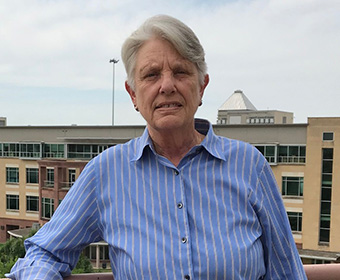Posted on June 10, 2018 by Jana Schwartz
Senior Lecturer Jolyn Mikow, is working with Child Protective Services employees to help them attain their graduate degrees in social work.

(June 5, 2018) — Jolyn Mikow focuses on cultural issues in social work, child welfare abuse and neglect prevention and intervention, and the evaluation of social service programs. As director of the UTSA Social Work Education Program Title IV-E (SWEPT) in the College of Public Policy, she works with Texas Child Protective Services (CPS) employees who are studying to earn their master's degrees.
We sat down with professor Mikow to talk about her work with CPS employees to reduce child deaths rates in San Antonio.
You always have lots of projects going on at once. What's exciting you the most these days?
We are planning for the expansion of the SWEPT contract to be able to fund more CPS employees getting their graduate degree in Social Work. Given the high rates of child abuse and neglect in Texas, CPS employees need the specific education, knowledge and skills this degree provides to effectively intervene with the struggling families.
The funds provided in the form of stipends, for CPS employees committed to a career in public child welfare, are used to pay tuition & other educational costs, allowing theses employees to get their Master of Social Work degree. After obtaining the degree, these employees are contracted to stay employed with CPS for a defined period of time. Once the contract period has been completed, they can leave the agency with no repayment of the stipend.
Our students include employees of the Texas Department of Protective and Family Services Regions 8 (San Antonio) and 11 (Corpus Christi). There are more than 10 similar programs in the state of Texas at other universities and more than 100 across the nation.
What impact do you hope your research will have?
I believe promoting an educated CPS workforce will translate into lower rates of child abuse and neglect and help reverse the high child death rates in San Antonio. It is rewarding to watch the CPS students begin to grow and develop in their understanding of social works focus and knowledge about struggling high need, low resource populations.
How has your personal journey influenced your work?
I was, for more than 13 years, a CPS employee, and I earned my graduate degree with the support of this very same program in rural West Texas. I remember that the growth I experienced and enhanced skills and knowledge I gained changed how I worked my cases and saw the struggle of these families and children. It was a revelation and made me a much more effective CPS employee. That experience inspired me to get my Ph.D.
Have you had any mentors?
Yes, there was one memorable supervisor that supported me in my growth and was encouraging. Attending graduate school while working full-time with kids at home was a stretch, but she consistently encouraged me to hang in there.
What do you think is the biggest challenge researchers in your field are facing?
The biggest challenge to this program is the decreasing funding rate. Since starting, we have experienced a 50 percent decrease in funding, which translates into fewer CPS students getting their Master of Social Work degree. It has been a challenge to keep the funding up without cutting any services or student stipends. Some years, it is close and I rely on the UTSA Downtown Campus Research Service Center to work with me through the budgeting process.
Any advice for this generation of students?
Yes. Pursuing your graduate degree is worth it, even if you just go part time so you can work. It will open all kinds of doors. Your life will be richer and more rewarding for it.

